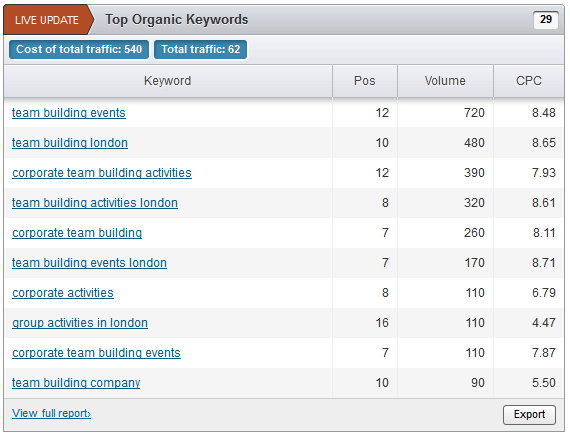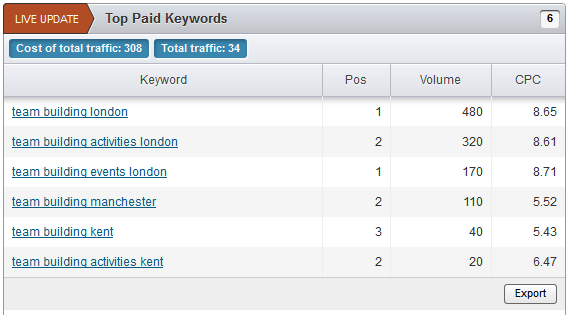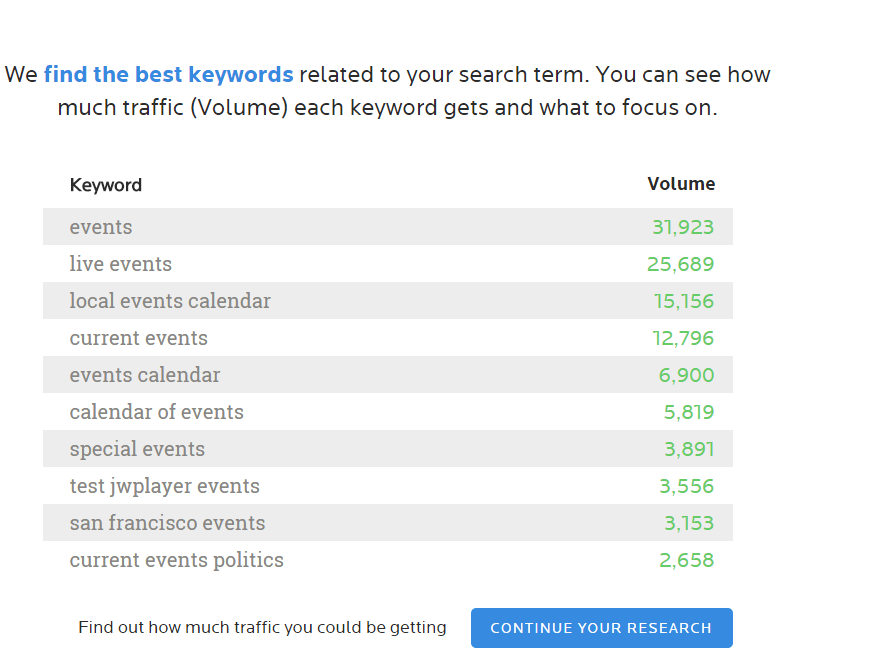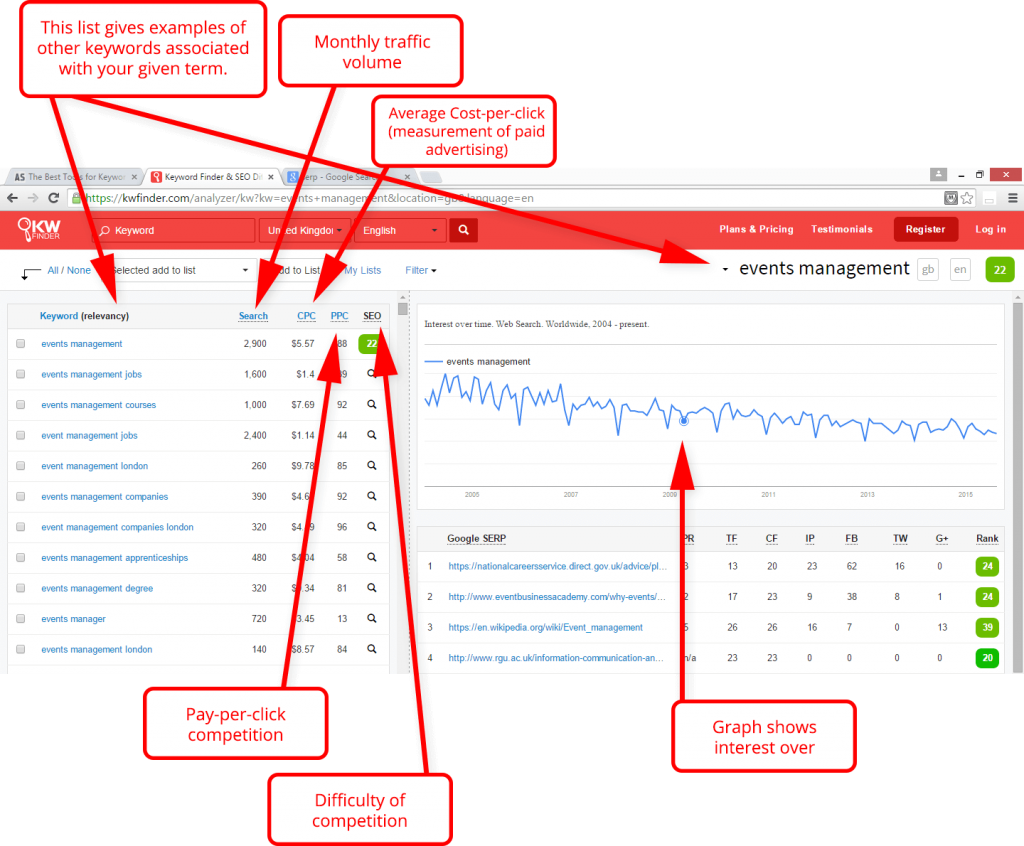How to Choose the Right Keywords for your SEO and PPC Campaigns
Selecting the right keywords can either make or break your digital marketing campaigns. Keywords are essential when building links, as they help searchers to find your site in particular. The bottom line is, they need to accurately reflect what you offer.
When creating a list of keywords to use, you need to think about the kind of search phrases people will use to find you via a search engine. But there’s much more to consider to ensure you’re targeting the right keywords that are likely to bring you the right kind of business.
With all the options available to you, it can be a bit of a confusing process. But not to worry – this guide will take you through how to choose the right keywords for any search campaign.
Brainstorming
The first step to choosing suitable keywords is to brainstorm your ideas. Write down a list of key terms that relate to your business – try and think of as many as you possibly can. Start to think about what you really provide for your customers.
Let’s pretend you’re running an events management company. The keyword ‘events’ may be relevant to what you do, but it doesn’t tell us much about what kinds of events are on offer, or where the events can be held. Because it’s such a broad term, it’s likely that many other businesses out there are trying to rank for it too, so competition will be high.
With this in mind, it would be best to narrow down your keyword selections. What specific events can you provide? Stag dos? Corporate events? New Year’s Eve parties? And which areas can you feasibly service? Explore all options.
The importance of an integrated search campaign
Within the world of search marketing are two main factions – organic search and paid search. Both approaches should be incorporated into an integrated campaign. It’s essential that any business, large or small, chooses the right keywords to target within this campaign. With a wide range of tools available on the web, companies from any industry can now accurately assess and evaluate keywords that they believe will bring the right kind of traffic to their website.
Organic Search Campaigns
To get a web page to rank organically, i.e. without directly paying for an ad placement in the search engine, you need to address a number of different onsite and offsite factors. Ranking within the first 10 results of Google search is no mean feat, but with consistent hard work and a realistic budget, it is possible to thwart your competition. You will need to engage in some link building practices, and you should refine and update the content on your website – but, once you have established your website as a trustworthy, credible and relevant source of information within your industry, you’ll start attracting traffic from first-page positions.
Google’s own analysis tool, Google Analytics, tracks the traffic to your site and can give you a valuable insight into who’s visiting you, where they came from, and the journey they took through your pages. It’ll also give you other important stats, such as how many people visited your site in any given time period, and how long they spent on each particular page. All of this information can help you determine which of your marketing efforts are having the biggest impact on the amount of business you get from your website – and you can adopt a more informed SEO strategy, too.
Paid Search Campaigns
The paid search model, otherwise known as Pay Per Click (PPC), can be used to generate traffic directly to your website from ads that are placed in a prominent position within the search engines or across the publisher network. Using the search engines’ own ad management tool (in Google’s case, Google AdWords), you can ‘bid’ for ad space for keywords that are relevant to your business. You only pay if a user clicks on your ad and is taken through to your website.
Using PPC effectively can enable you to quickly gain traffic, but costs can stack up, particularly if you are targeting very broad keywords. This is because you’ll need to ‘out-bid’ your competitors if you want your ad to sit in prime position. The trick to running a cost-effective PPC campaign is to ensure that your clicks eventually convert into paying customers.
As time progresses and you start to achieve more exposure from your organic search campaign, you may slowly draw away from PPC advertising. After all, if your site is maintaining high volumes of traffic naturally, why spend money if you don’t have to?
Keyword Tools
Beyond Google’s own programme, there are several alternative SEO tools around the web. Word Tracker can help businesses track where web users found the site, the source of traffic and it also reports traffic on your keywords. This allows the marketing department to evaluate how well the keywords are performing. Here is an example of a search on word tracker for the key term ‘events.’
The results are very clear and easy to understand – they show the keywords with the best traffic and the volume of traffic. This information will allow a business to see what terms do, or do not have traffic. However, it is important to remember, just because a term has high traffic volume, does not necessarily mean you will rank well for it – it just means that there are high levels of competition.
Different types of keywords
When it comes to selecting your keywords, there are many different routes you could take, and all of them are dependent on your end goals. Each keyword targeting strategy will have its benefits and drawbacks, so it is essential to evaluate what kind of traffic you want to receive as a result of your campaign first of all.
Keywords are categorised by ‘match types’. It’s particularly important that you learn the difference between these keyword match types if you are developing a campaign with a paid search platform such as AdWords.
Exact match keywords
Exact match is the most specific and restrictive match type. If you use this setting in your paid search campaign, your ad will only appear when the exact phrase is searched. Using exact match keywords will attract those looking for a precise product, and this strategy can often result in higher conversion rates and less unwanted traffic and costs.
For example, if you wanted to target the keyword ‘event management’ as an exact match, your ad will only be displayed if the user types this specific keyword directly into the search engine. Your ad would not appear for closely related keywords such as ‘event management company’ or ‘event management services’.
Utilising exact match keywords allows you to target your preferred demographic more effectively. In turn, your audience will be more receptive, because your ad is fully tailored to their exact search.
Furthermore, to incorporate exact match terms into your campaign, ensure that you use brackets. By surrounding a keyword or phrase in brackets your ad will only appear for an exact match. For example, if [events management] is on your list, your site is eligible to appear.
Phrase match keywords
The use of phrase match keywords offers a degree of the versatility, but allows for tighter control when it comes to targeting and, in terms of paid search, monitoring your click spend.
The order of the words in phrase match is important, but there may be other words before or after that phrase. For example, if you set your paid search campaign settings to ‘phrase match’ and your specified key phrase is “events management”, your advert could appear when terms such as “cheap events management” or even localised phrases such as “events management Essex” are used in search queries. This search will help to expand your audience whilst ensuring you’re still only showing for highly relevant searches, and will give the searcher wider choice.
Broad match keywords
Broad match keywords allow you to reach the widest audience, as you will appear for queries that use any word in your key phrase, in any order and synonyms. Due to the nonspecific quality of these keywords, you could end up spending a lot of money on irrelevant traffic that won’t convert. In order to deter this kind of traffic, negative keyword lists can be used.
Negative keywords
Negative keywords are a type of keyword that prevents your ad from being triggered by a certain word or phrase. It tells Google not to show your ad to anyone who is searching for that phrase.
A popular reason for the use of negative keywords is that the original keyword creates an unwanted association for the brand. For example, if a high end events management noticed they had traffic for the term ‘cheap events’, they may choose to add this to their negative keywords as this is not the service they provide.
By using negative keywords, a business is able to further tailor their search in order to only be viewed by those who are most likely to convert. By finding the exact people who want your business’ products or services, you can increase your click through rate and in turn, reduce your cost per click.
Long-tail keywords
Although they generate the least amount of traffic, long-tail keywords can often generate the lowest cost per click. The reason for the lower cost is due to the lower volume of competition surrounding them.
In the case of the event management company, an example of a long-tail keyword would be ‘5 year old clown birthday party’. This very specific search query will generate results using those words and will help the searcher find exactly what they want, but will give limited results – there are only so many companies out there offering this particular service, after all!
On the other hand, targeting such a niche area will ensure that you only receive traffic from users that are actually interested in 5 year old clown parties. Using specific terms like this will help increase your relevant traffic and simultaneously reduce your bounce rate. The trick is to investigate how many people are actually searching for these keywords per month in any given area, because if Google’s not recording any demand for them, you could be wasting your time and reaching out to an audience that doesn’t exist. More information on how to find up to date search volumes can be found below.
Google Keyword Planner
A platform that helps you generate ideas for target keywords is Google’s Keyword Planner. It’s a great PPC and SEO tool that will help you find and manage relevant keyword lists for your campaigns. The Keyword Planner can also support keyword research, as it allows you to find various phrases related to your product, brand or any other key search term.
The Planner can offer a great deal of historical information on the traffic a keyword obtains from search, which will permit you to decide whether targeting it is going to be cost effective for your business. Additionally, the Keyword Planner will generate traffic forecasts which will spot keywords with developing or declining search popularity, helping you to identify trends and adjust your search marketing plan according to demand.
After you’ve created a Google AdWords account, you can log in and take advantage of all the functionality of the Keyword Planner. Just a selection of the available actions include: searching for new keywords and ad group ideas; getting search volumes on particular keywords; generating traffic forecasts; and multiplying keyword lists to get a new keyword idea.
SEMRush
Another very useful SEO tool is SEMRush. SEMRush helps to analyse your competitors’ search strategy in regards to how they’re advertising online, where they’re getting their links from, and, arguably most importantly, which keywords they are targeting and ranking for in organic and paid search channels.
Once you’ve set up an account with the site, you can see your competitors’ best keywords, discover your main competitors in search, and monitor position changes for certain domains. Here is a sample list of organic keywords used by a real-life, London-based events company to give you a better understanding of how SEM Rush presents information.


How to analyse search volumes
Besides SEMRush and Google Keyword Planner, a great way to analyse search volumes is to use an SEO tool KWfinder. This tool allows you to input a keyword and will generate other keywords with varying degrees of relevancy. It will also provide information on each of the phrases, including their search volumes, the CPC, the PPC and the SEO. As if that wasn’t enough, the tool provides a graphic description of the historical data of the search term and will give information on each of the search engine results! Best of all, you can get all this data for free! Here is an example of what the site can offer you:
Summary
The choice of keywords will make or break an SEO campaign and your short, medium and long term goals must be kept in mind when picking them. In the short term, a page can rank well using localised long-tail keywords, as not many people will be searching for these terms, but generally those who do are more likely to become conversions. Moving towards the medium term goals, a company should start to introduce broader terms with higher traffic volumes. Broader terms will be visible to more people and this will increase your CTR. Additionally, long term goals of any business would be to rank highly for the broadest terms.
A final note – although both paid and organic search campaigns have their benefits, they work best when used together in an integrated search. In the early stages of a campaign, it may be more effective to spend money on PPC via AdWords in order to rank highly and quickly for the most competitive keywords whilst also working on your organic strategy which takes more time for the full effects to be felt. Another major advantage of using PPC first is to discover which keywords provide the best ROI. When you know which search terms bring in the most business, you can start to properly plan your organic SEO campaign.
Once your organic campaign is strong enough and you have well covered keywords, you may be able to start withdrawing your funds from your paid searches. Then, you can start to look at new keyword phrases to target, and the process starts all over again.
























